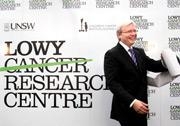Making a mark on cancer
Prime Minister Kevin Rudd was joined by NSW Premier Kristina Keneally to officially open the Lowy Cancer Research Centre at UNSW.
Prime Minister Kevin Rudd was joined by NSW Premier Kristina Keneally to officially open the Lowy Cancer Research Centre at UNSW.

Prime Minister Kevin Rudd was joined today by NSW Premier Kristina Keneally to officially open a world-class research facility that aims to give new hope for children and adults with cancer.
The Lowy Cancer Research Centre, at the University of New South Wales, is the first facility in Australia to bring together childhood and adult cancer researchers.
The $127 million Centre will be home to 400 scientists from UNSW's Faculty of Medicine and Children's Cancer Institute Australia (CCIA). The collaboration of many of Australia's finest researchers in state-of-the-art facilities will take translational cancer research to a new level. Three cancer-fighting drugs developed by the Centre will be in clinical trials this year.
Funding partnerships
The Prime Minister said the Australian Government was proud to be a partner in the new facility.
"The Lowy Cancer Research Centre is a critical step in supporting our world-leading cancer researchers, whose discoveries will directly translate into better patient care and carry the potential to save generations from cancer," Mr Rudd said.
The NSW Premier said: "NSW is leading the world in cancer research and improved cancer detection, treatment and care.
"Since 2004 the Cancer Institute NSW has provided over $26 million in funding to UNSW affiliated centres and programs - research that will now be housed in the Lowy Cancer Research Centre," said Ms Keneally.
Generous donation
The Centre is named in recognition of leading businessman and philanthropist Frank Lowy and his family, who donated $10 million towards the cost of the new building - one of the largest single philanthropic donations received by the University. Other significant funders of the building include the NSW Government ($18 million), the Federal Government ($13 million) and UNSW/CCIA.
"It's an honour for our family to contribute in any way to such an important field of medical research," Mr Lowy said. "We believe that this new facility and the world-class research team it brings together can in some way help reduce the impact of cancer on our society."
UNSW Chancellor Mr David Gonski and Vice-Chancellor Professor Fred Hilmer thanked both levels of government for their support and highlighted the significance of the Lowy family's contribution.
"It is important that such significant support has come from the private sector," said Mr Gonski. "We are enormously grateful to the Lowy family for their generous donation, which has made the construction of this facility possible."
Professor Hilmer said: "I believe this world-class centre will take cancer research in this country to a new level, helping to put Australia at the forefront of efforts to find cures for childhood and adult cancers."
Cancer currently kills one in three Australians. Primarily a disease of ageing, cancer diagnoses and deaths are expected to increase significantly as our population ages.
World-leading researchers
The Lowy Cancer Research Centre is home to two winners of the state's top cancer research prize and several of its leading scientists were recognised in the 2010 NSW Premier's awards for outstanding cancer research.
"Our aim is to cure 100 percent of childhood cancers and turn adult cancer into a manageable disease like diabetes, so cancer sufferers can lead long and productive lives," inaugural Centre Director and 2009 NSW Cancer Researcher of the Year, Professor Phil Hogg, said.
While progress had been made in the detection and treatment of many cancers, there was still a long way to go to prolong lives and reduce suffering, he said.
Common research pathways
"While adult and childhood cancers are very different diseases, getting both groups of researchers together will lead to new ways of thinking and significant breakthroughs."
The most common childhood cancers - those of the nervous system and leukaemia - are rare in adults; however, researchers are increasingly finding common pathways, according to head of the Centre's childhood cancer program and Executive Director of CCIA, Professor Michelle Haber.
"There are proteins and genes in common and there are potential treatments in common. That was one of the key driving agendas for combining the efforts of adult and children's cancer researchers in the one building," Professor Haber said.
Head of the Centre's clinical trials program, Professor Robyn Ward, said the location of the Centre alongside three of NSW's leading teaching hospitals would facilitate the transfer of discoveries into patient care.
"Our main aim is to take our discoveries and move them as quickly as possible into patient care to really make a difference to the lives of cancer patients."
For more information about the Centre and its research go to the website
Media contact: Steve Offner, UNSW Office of Media & Communications, 0424 580 208